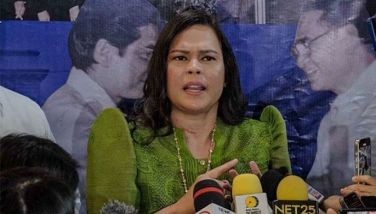F. Sionil Jose, a Filipino literary giant

On Dec. 3, we commemorate the 100th birthday of F. Sionil Jose. A good time as any to honor him with a reading of his autobiography. A life so eventful mirrored in his fiction that it became the basis of a recent successful play, “Balete,” staged by Tanghalang Pilipino. De La Salle is holding a special Centennial Conference “The Man from Rosales” on Nov. 28.
“Promdi: an Ilokano Autobiography” (Solidaridad Publishing House, 2021) is the story of F. Sionil Jose. “Strictly speaking, this is not an autobiography because it is not a linear narration of my life. These are collected essays I have written through the years. Most have appeared in … The Philippine STAR, in my weekly column, ‘Hindsight,’ bits and pieces of an examined wanton existence as well as observations of important events and decision makers of the country’s destiny.”
Many of the essays have to do with his youth – growing up in his hometown of Rosales, Pangasinan and high school in Manila. His description of Manila before the Second World War can only be compared to the description written by Nick Joaquin. He writes of the social classes: “Before World War II, the higher you go up, so the old saying goes, the whiter it becomes – Spanish white, and the elite language was not English, but Spanish. The Spanish mestizo landlords dominated Filipino society and President Manuel Quezon personified that leadership.”
He mentions one of the topics that has made him controversial, which is his attitude towards ethnic Chinese. For example, he says, “I can understand the loyalty of our ethnic Chinese towards China, the motherland, the fount of history and tradition.”
While he talks about the contribution of the Chinese to the country, I notice that he refers to them as Chinese, not as Chinese Filipinos. “Years ago, I wrote about our so-called Chinese problem and I was immediately branded as anti-Chinese.”
His essays on his career in journalism are of historical value. It started when he joined and became the editor in chief of The Varsitarian, the university’s student paper. His early years in journalism are actually a history of the newspaper industry. It started in 1948 when he actually worked for the United States Information Service at the American embassy. After graduation, he worked as an associate editor and eventually editor of The Sunday Times Magazine.
When he talks about his life in journalism before martial law, he sounds like name-dropping when he mentions the names of journalists he worked with and for, like Chino Roces, Arsenio Lacson, Vicente del Fierro, Yeyeng Soliongco, Joe Lansang and Celso Cabrera.
One interesting tidbit is his narration that during the Marcos years, he sympathized with the New People’s Army but stopped believing in them when they did not go to EDSA.
He devoted many pages about people he admired and one whole chapter he dedicates to the members of the clergy he admired. These were mainly Dominicans and Jesuits. Surprisingly, it did include a single De La Salle Brother: “And Brother Andrew Gonzalez of La Salle– how he loved good food, teaching, life. Though of the manor born, he was suffused with the egalitarian ethos, he wanted the best education to reach the most number of people. His language was earthy, his mind wide open and warm – I adored the man and dedicated one of my books to him.”
There is, of course, the story of how he set up the Solidaridad complex which included Solidarity Magazine, the Solidaridad Publishing House, the bookshop and the Solidaridad Galleries. His guest of honor at the bookshop opening was Carlos P. Romulo. The first book issued by his publishing house was “Identity and Change” by Romulo.
There are the many interesting people he met, like Robert Frost, the poet. He also writes that his French translator, the metaphysical poet, Amina Said, compared him to Albert Camus. He also writes that he has also been compared to Gorky and Conrad. However, he says that it is Jose Rizal who has influenced him most as the person he would most like to be compared to.
F. Sionil Jose is the literary writer – Filipino and otherwise – that I most admire. I must admit, however, that he is a highly controversial person.
One of the most controversial essays that he wrote, one I totally disagree with, is “Maria Ressa does not deserve the Nobel.” Here is what he wrote: “… let us look at Maria Ressa’s credentials. The most important is that she worked for CNN. I haven’t read anything memorable by her.” He also wrote: “I am not envious of Maria Ressa getting the Nobel. It is for Peace, not Literature. Of course, I wanted it very much. I wanted to do many things outside of writing.”
F. Sionil Jose wrote “The Rosales Saga,” a five-novel epic that encompasses one hundred years of Philippine history, 1872 to 1972. No other Filipino writer and very few international writers have come close to such a literary accomplishment. He deserves international recognition and I dare say, the Nobel Prize for Literature.
- Latest
- Trending


























